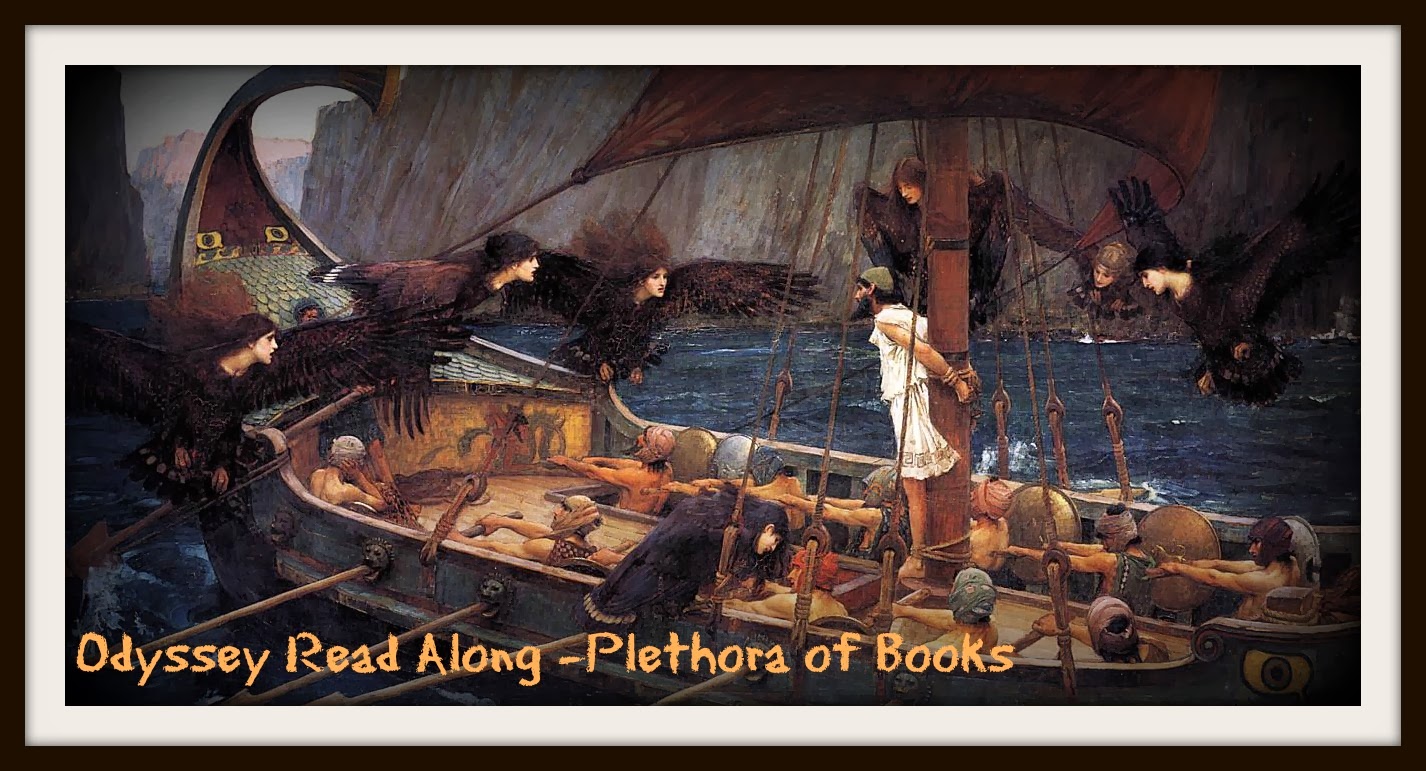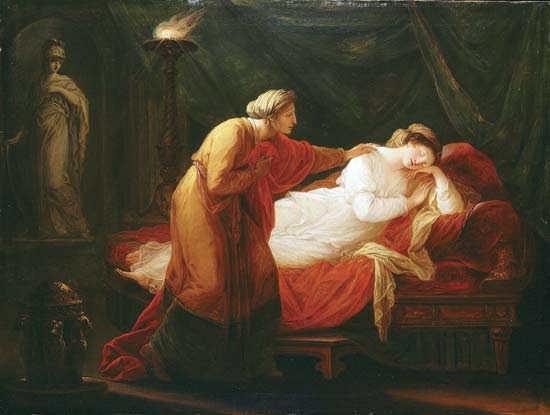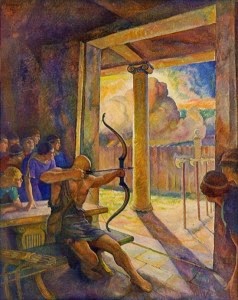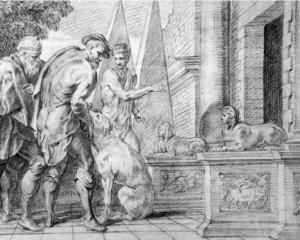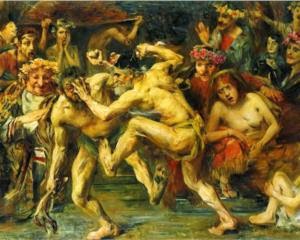Chapter 17 – 18
Candide and Cacambo decide to head for Cayenne. After their horses die and after months of near-starvation, they decide to trust to Providence, climbing in a boat and sailing downstream. After travelling a great distance, their boat is smashed against a reef and they have to climb over rocks for three miles until they see beautifully elaborate carriages and come to a village. They are flabbergasted to come across children playing quoits with gold, rubies and emeralds and, assuming they are all the children of kings, they return the abandoned jewels to the schoolmaster when the bell rings, but he only laughs and drops them to the ground. Rescuing the jewels they continue on until the reach an inn, entering to find waiters and waitresses exquisitely dressed and dishes that would feed royalty. When they try to pay with the gold they took from the road, they are laughed at and told that the meals in the inn are paid for by the government, but perhaps they did not know because this village is one of the poorer villages. Candide and Cacambo are amazed. They are then taken to a learned man of the court, and find they are in the former land of the Incas, that has flourished because no one of its citizens is allowed to leave it, which has preserved innocence and happiness. Their kingdom is called El Dorado. There, the people worship God but don’t ask him for anything because they have everything they need. Candide and Cacambo are put in a carriage pulled by sheep and taken to the king’s palace where they are pampered and clothed and told to kiss the king on each cheek when they meet him. They spend a month there, but Candide is pining for Cunégonde so they decide to return to civilization. The king cannot understand their desire to leave but builds a machine that transports them out of El Dorado. They set out from there with Bueno Aires as their destination, planning of all the wonders they can buy with their riches.
Have Candide and Cacambo found “the best of all worlds” in this chapter? Voltaire appears to suspend his satire when directly dealing with the people from El Dorado. What does this mean? Is he saying that the “best of all worlds” can only be found in a fantasy? He also makes the comment that El Dorado is as advanced as it is because the people have never left and therefore maintained their innocence and happiness. Does he think when ideas and customs travel across boundaries, those “foreign” ideas and customs can corrupt society? And further, does he comment on societies’ view of wealth: if we ceased to value material objects (such as the disinterest the people of El Dorado show towards their gold and jewels), will the renunciation of materialism make a well-functioning, more contented society?
Chapter 19 – 20
Their troubles begin again. Approaching a town, they see a Negro lying on the ground with one leg and one hand missing. He relates that his master is to blame for his plight, as he (the Negro) got a finger caught in the millstone, hence the loss of his hand, and then was caught stealing, hence the loss of his leg. Candide is horrified, renounces the philosophy of Optimism and they move on. The first ship they encounter won’t transport them to Bueno Aires and Candide finds out Cunégonde is the mistress of the governor of the city. Candide plans that Cacambo will go there to rescue Cunégonde and he will meet them both in Venice. He makes a deal with a captain, a Dutch merchant, to sail to Italy but the captain deceives him and sails with his money and the only two sheep he has left from the gifts of the people of El Dorado. He takes his case against the captain to a judge, but the judge only fines him for being noisy, charges him court costs, and says there is nothing he can do until the captain returns. This is the last straw for Candide and he appears to give up on the goodness of man altogether. He finds another ship going to France and offers free passage, food and 2000 piasters to a companion; from the myriad of applicants he choses a poor scholar, Martin, who has had at least as many misfortunes as Candide. The two companions have a philosophical discussion about moral and physical evil during the voyage. While Candide still has hope for Pangloss’ philosophy, Martin announces that he is a Manichean. He tells of all the troubles he has experienced, and meanwhile their ship sinks a Spanish ship, which turns out to be the ship of the captain who robbed Candide. All the men drown but one of Candide’s sheep is pulled on board. Candide and Martin argue for weeks.
Manicheaism – a religious doctrine, widely prevailing in the 3rd – 5th century, that the universe is controlled by two antagonistic powers, light or goodness, identified with God, and darkness, chaos, or evil. Trivia: St. Augustine was a Manichean before his conversion.
An important point in the story occurs here: Candide categorically denounces Pangloss’ Optimism for the first time. Candid has been basing his opinions often on what has happened to other people, but more and more he is experiencing sufferings himself. Martin’s worldview is obviously one where evil is seen as the overriding force in society. While Martin’s observations don’t appear unrealistic, they do appear excessive for one person to experience. One must question Candide’s choice of a companion. Rather than balancing his viewpoint, one would think it would make him an extremist of one order, in the same way Pangloss’ one-sided views would make him extreme in another.
Chapter 21 – 22
They approach France, and while Martin relates that he has been there, he has nothing good to say about it. Candide fires questions at Martin which are all given pessimistic answers, culminating with, “… if hawks have always had the same character, what makes you think men may have changed theirs?” Candide asks about free will and the discussion continues. Because all the travelers Candide meets say they are going to Paris, he decides to do likewise. He becomes ill and receives the attention of two doctors, whom he does not know nor want. He is accosted by a number of people wanting money, of which Candide has not a clue and gambles, wondering why he never has any aces. An abbé from Périgord befriends him. He takes them to the theatre, claims that in France they respect their queens when they are beautiful and toss them in garbage dumps when they’re dead, and laugh even when they are committing crimes. Candide wishes to meet Madame Clairon, the actress, but the abbé takes him to meet a lady of a gambling establishment, where Candide manages to lose an enormous chunk of money. The talk around the dinner table is of novels and great men. Candide tries Pangloss’ philosophy on a dinner partner but the man disparages his words. The lady of the house seduces Candide, not only out of his loyalty to Cunégonde, but two of his diamonds. The abbé uses devious tactics to extract information about Cunégonde and Candide’s plans, then the next morning Candide receives a letter from Cunégonde, begging him to come to her in the city where she is staying. Candide arrives with a bag of gold and diamonds, but is told the bed curtains must not be drawn. Suddenly the abbé arrives with officers who arrest him and Martin, yet Candide bribes them for his release, and one agrees to take him by ship to Portsmouth, England.
Again, I don’t care much for Martin. I’m not sure what purpose he serves other than to rain skepticism and negative opinions over much of their enterprise. Whereas Cacambo was not surprised by human nature because he took everything in stride, Martin is not surprised by human nature because he always expects the worst from it. Of course, we meet another avaricious and duplicitous church man, the abbé. The society of Paris is shown as a sophisticated yet a shallow microcosm of human interactions and entertainment. Nearly everyone whom Candide meets attempts to exploit him for his riches. Candide finally flees the city.
 |
| Faubourg Saint-Honoré 1615 |
Chapter 23 – 24
Martin, at a question from Candide, tells him people in England are also mad but it is a different kind of madness than the French. He claims the English are moody and morose, and the first sight they witness is an admiral being executed because he didn’t kill enough Frenchmen. After witnessing this atrocious act, Candide refuses to set foot on shore, and two days later they sail for Venice. Candide is elated, thinking he will find Cunégonde and that “everything is going well.” When they reach Venice, Candide searches everywhere for Cacambo but he is nowhere to be found and Martin claims that he probably ran off with Candide’s money. Candide agrees with Martin that, “life is nothing but illusions and calamities”. Upon seeing a monk and a young woman, Candide remarks upon their happiness but Martin thinks otherwise. They invite the two to dinner and find out the girl is Paquette, Pangloss’ mistress, who has had to sell herself to survive, along with other miseries, and that the monk was forced into his vocation by his parents and that the prior steals half his pay and he spends the rest on women. Martin has won the bet; Candide gives Paquette and the monk money, but Martin doubts they will be happy with it. Candide then announces he has heard of a senator Pococurante, who makes everyone welcome at his palace and they decide to go and see him.
The execution of the British admiral is based on a true incident and one which Voltaire actively campaigned to stop. War, again, is a theme and Voltaire brings to the forefront the lack of logic of it, in proportion to the benefits. Voltaire shows another corrupted churchman, yet this time the monk was simply a victim of circumstances, one who did not choose his profession but was forced into it. Martin’s observation that money will not make the couple happy is shrewd; so far all Candide’s riches have not made him happier and his optimism, while he still clings to vestiges of it, is being whittled away. Will his encounter or lack of one with Cunégonde push him over the edge? We shall see ………….
 |
The Grand Canal in Venice from Palazzo Flangini to Campo San Marcuola
about 1738
source Wikipedia |
Discussion Questions:
What do you think about Martin?
I do not like Martin at all. He is a foil to Pangloss. Pangloss looked for good without actually seeing and, in a way, Martin looks for bad or evil without actually seeing. If you expect people to be untrustworthy or swindlers or cruel or avaricious, that is what you will start to see and, if you have practiced it to the degree that Martin has, I doubt you would see anything else. I actually think Voltaire did his argument a disservice by using him, but I guess that remains to be seen.
Does a utopia like El Dorado sound appealing to you?
There were certainly things I liked about El Dorado. I think that a certain amount of autonomy can be beneficial to a country/society. The people of El Dorado are knowledgeable and curious, yet they have a special type of wisdom that has created an harmonious balance. Now do I think that it is realistic? No. Balance in human nature is hard to achieve and there will always be corruption, struggles for power, etc.





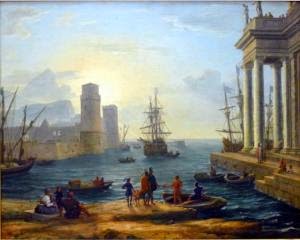
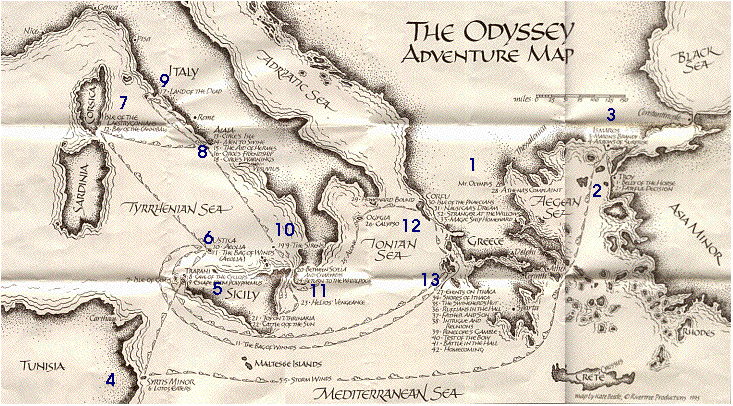





.jpg)





